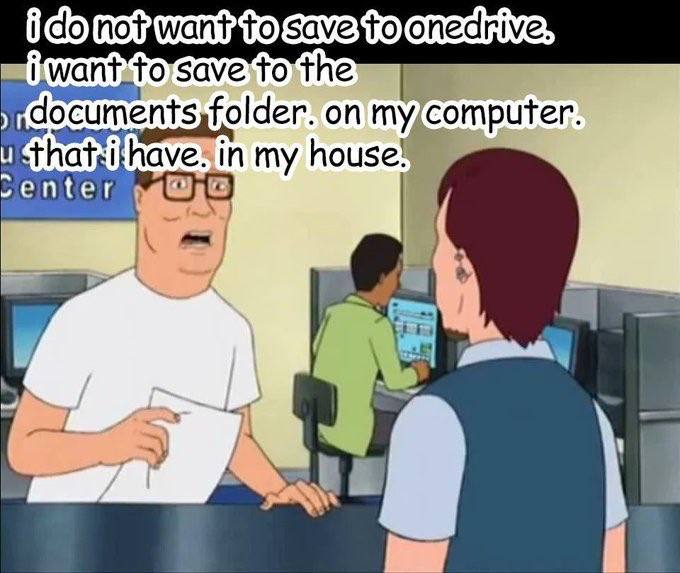this post was submitted on 10 Jul 2024
1764 points (98.9% liked)
Memes
45878 readers
1893 users here now
Rules:
- Be civil and nice.
- Try not to excessively repost, as a rule of thumb, wait at least 2 months to do it if you have to.
founded 5 years ago
MODERATORS
you are viewing a single comment's thread
view the rest of the comments
view the rest of the comments

The moment a lawyer saves their medical records in a way that unintentionally and without their consent uploads them to OneDrive, they have a pretty solid case to charge Microsoft for a HIPAA violation.
HIPAA doesn't even require encryption. It's considered "addressable". They just require access be "closed". You can be HIPAA compliant with just Windows login, event viewer, and notepad.
(Also HIPAA applies to healthcare providers. Adobe doesn't need to follow HIPAA data protection, though they probably do because it's so lax, just because you uploaded a PDF of a medical bill to their cloud.)
HIPAA applies to whichever entity consciously chooses to move/store data.
Generally, after a patient downloads a healthcare-related item, they are that entity - and as the patient, they have full control/decisions about where it goes, so they can't violate their own HIPAA agreement even if they print it and scatter it to the wind.
BUT, if your operating system "decides" to upload that document without the user's involvement, then Microsoft is that entity - and having not received conscious permission from the patient, would be in violation. It's an entirely different circumstance if the user is always going through clear prompts, but their more recent OneDrive Backup goal has been extremely forceful and easy to accidentally turn on - even to the point of being hard to disable. As you said, encryption has nothing to do with it.
No. Microsoft is not liable, at least when it applies to HIPAA.
https://www.hhs.gov/hipaa/for-professionals/covered-entities/index.html
LOL. You really think Microsoft doesn't have an army of lawyers ensuring they comply with laws like HIPAA?
When they’re specifically writing business plans designed for hospitals, sure, they can likely account for it. But not when designing end user services that are laissez-faire about user data privacy - on the random things people put in “My Documents”. As with many organizations, it’s very possible the two parts of the corporation don’t talk to each other.
That's not how it works. Microsoft knows Windows will be used in medical settings. They know "but it's a product for home users" won't be an effective defense if they cause a HIPAA violation.
They also should “know” that being forceful about backup prompts, AI features, and major version upgrades will irritate users into switching off their OS, and yet they’re doing it anyway. Logic is not driving their actions; greed for data is.
Microsoft makes is money by selling products and services. Your data is not nearly as valuable as you think it is.
https://www.hipaajournal.com/onedrive-hipaa-compliant/#
Totally feasible to use onedrive.
However I've got no sympathy for even a small business to use IT without someone configuring their system in a way that controls this. A lawyer of all people know that knowledge is worth something.
It is feasible to CHOOSE to use OneDrive and take all the proper precautions. We're talking about home users getting OneDrive data uploaded without their consent through their "push assumed default", and "giant popup, tiny cancel" setups.
The article you link only says it's okay when using a OneDrive business plan together with a signed agreement.
You should be, if you're in a work computer with privileged documents, controlling it with an appropriate level of care. No matter Linux or Windows. If you're using home and defaults, you've failed no matter what.
We’re not talking about work computers. We’re talking about patients - end users who have downloaded documents from their doctor.
These people should not be blamed for using defaults, or for insecure actions happening from their inaction.
I said home computers multiple times and you again replied about work environments. You need to start paying attention.
Ah you're thinking I'm reading your other comments to other people.
BTW HIPAA is for providers for their patients information handling. Once it's in the person's hands, it's no longer under HIPPA and it no longer applies. If you decide to put your private medical information on a commercial advertisement board on a highway, and it's not breaking laws to do with acceptable adcertisement (eg gore or smut) you'll be able to do that to.
Basically theres no expectation for a individual person to adhere to HIPPA for their own personal information storage and it doesn't apply.
My assumption with your lawyer comment, is this was a insurance or otherwise medical malpractice lawyer who might collect this information for their client cases, since without having client/patient requirements, HIPPA is irrelevant.
Are we talking about the same comment?
Lawyers, once they take off the suit and go home to their kids, are end users, not businesses. It would simply be easier for someone to initiate the lawsuit if they have a background in law.